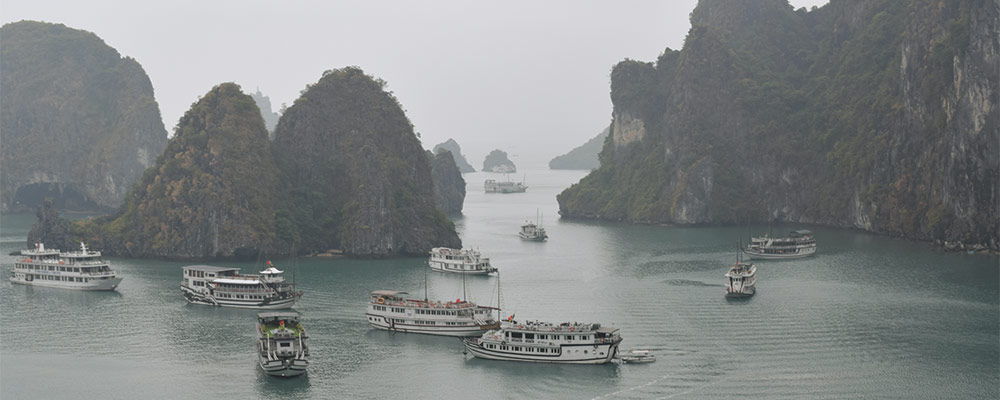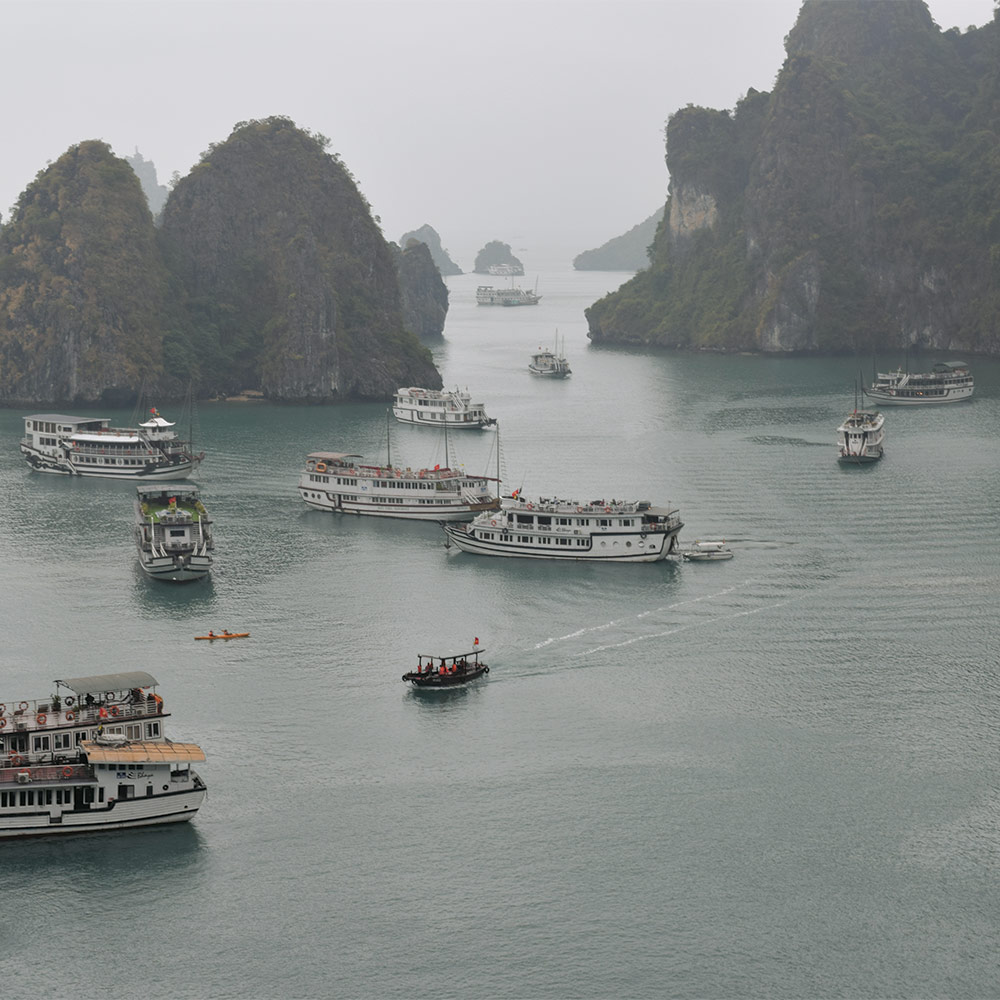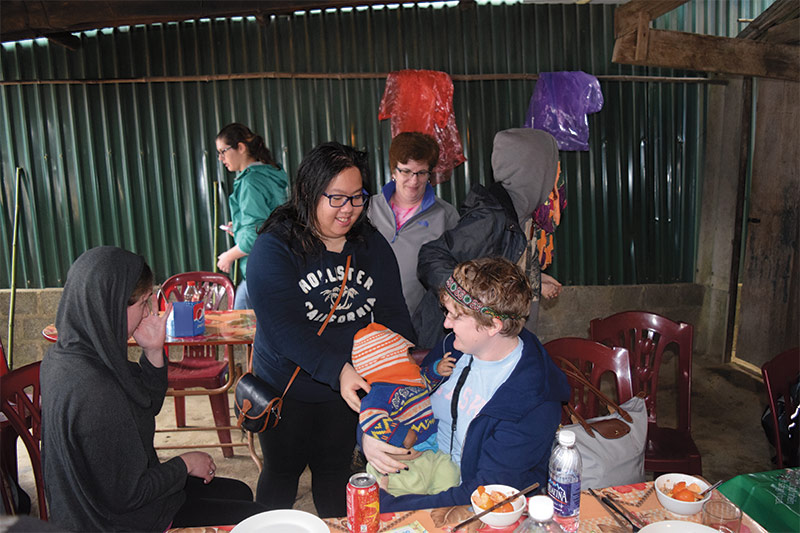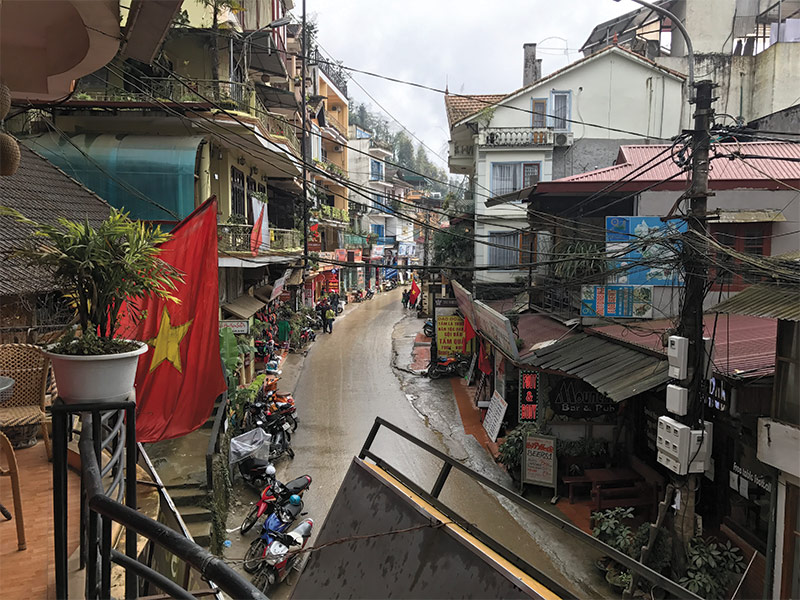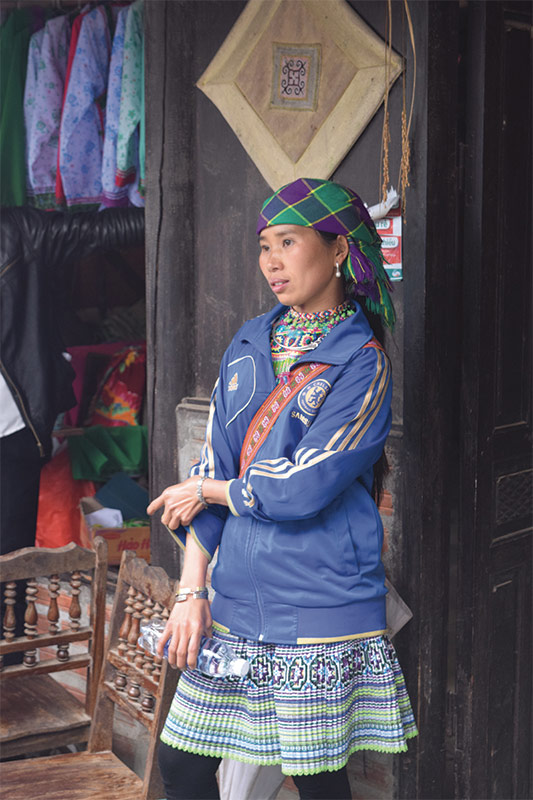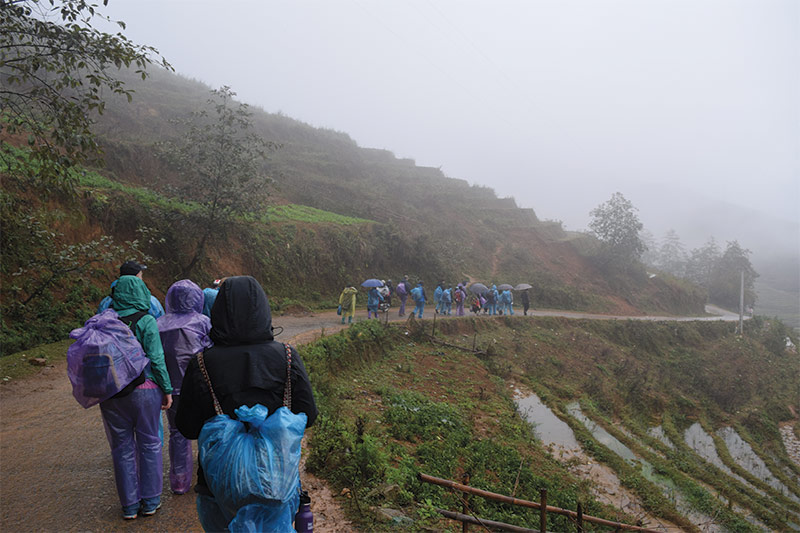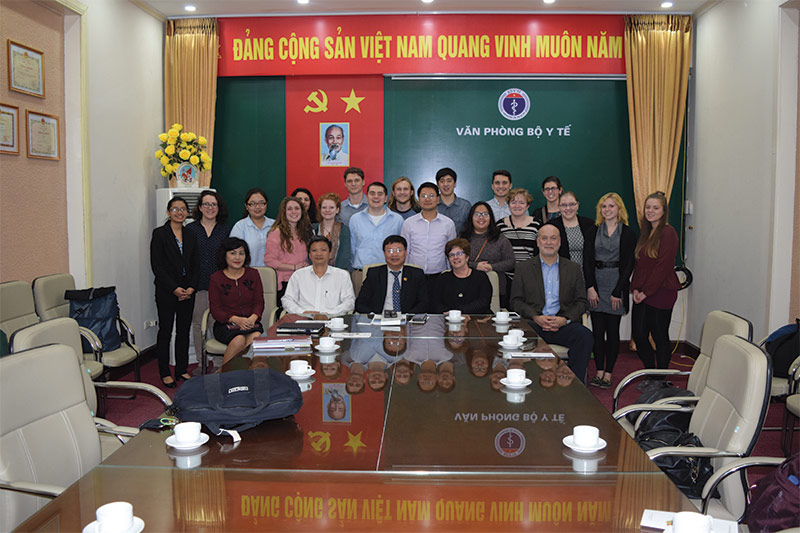In perhaps 99 out of 100 conversations between professor and student, such words would be considered and then quickly forgotten, probably lost to well-intentioned but distracted follow-up or discounting the effort because of the work involved.
It helped that the two participants in this conversation were Emil Nagengast, professor of politics and an academic noted for his eagerness to pursue a new interest, and Ha, a student who, once she gloms on to an idea, pursues her goal with the single-mindedness of the true believer.
Ha's experience as a student on The Gambia study abroad program challenged her preconceptions about Africa and The Gambia in particular. "I kept thinking about Vietnam and how assumptions can really shape our thoughts about a place," she says. "I kept trying to explain how Vietnam compares to other countries, but I soon realized the best way to explain Vietnam is to let them see it."
When the Juniata group returned from Africa, Ha headed home to Hanoi, and Nagengast returned to Huntingdon. The email blitz began. Ha wrote an itinerary, listing where students would visit and their participatory activities. She sent another itinerary that included a budget. Next, she added a budget that allowed for 12 student visitors. "I could tell he was interested," she recalls, smiling.
By June of 2016, Nagengast had agreed to visit Ha in Vietnam to see how a program would work. She took him to Hanoi, Ho Chi Minh City, Da Nang, Hue, and into the highlands of Vietnam. During the visit Nagengast visited three college campuses and gave two lectures. He was impressed at Ha's level of commitment.
Nagengast was able to get the course approved for the 2016-2017 academic year, which meant a fall semester class learning about the country, followed by a trip to Vietnam during winter break. In the following spring semester, all the participants were to write a paper reflecting on the trip.
"We could not have done this without Anh," Nagengast says. She even took over recruiting students for the trip, using Facebook to bring in 19 students, and all but one would make the final trip. The course cost $2,850, one of Juniata's least expensive study abroad programs, according to Kati Csoman, dean of international programs.
Juniata Provost Lauren Bowen also made the trip, not only to support faculty and students who were learning while abroad, but to speak with high school students and guidance counselors. David Sowell, who was unable to travel with the group, helped teach the fall semester class.
"I kept trying to explain how Vietnam compares to other countries, but I soon realized the best way to explain Vietnam is to let them see it."Anh Ha '17, Hanoi, Vietnam
Although most of the American students were familiar with Vietnam only through movies and television shows that reference the United States' involvement in the Vietnam War, Nagengast, Bowen, and Ha ensured the educational opportunities went beyond military history. The group of two faculty and 18 students arrived on Dec. 30.
"I came to realize how much I truly appreciate my family and our culture as Vietnamese people," says Truc Ly '18, of Westminster, Calif., and a Vietnamese-American. "Before going, I didn't feel very connected to Vietnamese culture and considered myself as more of an outsider. After immersion among the native Vietnamese I realized the many ways my family tries to incorporate Vietnamese values and traditions to my life."
The students met with leaders from the (Vietnamese) Veterans Association and with officials from the Health Ministry in Hanoi. "In Vietnam, meeting with health officials gave me an inside look into issues that the country faces within its healthcare system," explains Victoria Wolf '17, a biology POE from Saint Leonard, Md. "That experience helped me refine a career choice that would allow me to be actively involved in public health and healthcare development."
"The entire time I was there Vietnamese would just walk up and talk to us. They really do not harbor any ill feelings toward Americans."Haley Walker '19, Altoona, Pa.
Most of the Juniatians commented on how little Vietnamese dwell on the Vietnam War. Although the trip was heavy on military memorials (the Hanoi Military Museum, the Ho Chi Minh Mausoleum and Museum, Hanoi Citadel and Underground Bunker), many natives of the country have moved on. Plus, over five centuries Vietnam fought long, grueling wars with the Chinese, Japanese, and French before fighting U.S. military forces. Few see the war with Americans as a turning point in their epic history.
"The entire time I was there Vietnamese would just walk up and talk to us," says Haley Walker '19, a business and politics POE from Altoona, Pa. "They really do not harbor any ill feelings toward Americans."
"I will not forget walking through the mountain villages and interacting with those who lived there. Taking these trips can really impress upon us as young people the cultural differences in the world."John Bufalini '17, Altoona, Pa.
One of the most impressive and exhausting parts of the trip was the group's trip to Sapa, located in the highlands on Vietnam's northern border. The area is historically populated with many different ethnic groups. The Hmong, many of whom fought alongside American soldiers during the war, are among the most numerous.
The group spent two days slogging up and down mountainsides in the rain, but despite the weather, students were able to talk with Hmong people and learn about the group's culture.
"I will not forget walking through the mountain villages and interacting with those who lived there," says John Bufalini '17, a biology POE from Altoona, Pa. "Taking these trips can really impress upon us as young people the cultural differences in the world."
In addition, the group traveled to Hue, an ancient city in southern Vietnam that was home to a feudal dynasty. The Juniata contingent visited the Imperial Palace, as well as the Buddhist Pagoda and the King's Mausoleum. Danang, home to the largest American airbase used in the Vietnam War, was also on the list of destinations.
Although the schedule was crammed with travel, Ha and Nagengast also wanted to incorporate visits to several Vietnamese schools to meet with prospective students. "Anh and I had visited several schools when we did our first visit," Nagengast says. "We thought it was important to carve out some time in the schedule for school visits."
One of the most popular features of the visits was a six-hour scavenger hunt throughout Hanoi organized by Ha. "She teamed up one Juniata student with one Vietnamese student and it really bonded the students," Nagengast says. "It was a fun way to connect with kids who are very interested in studying somewhere in the United States."
Meanwhile, Bowen lectured to high school students and parents about the U.S. Constitution and peaceful transitions of power. The presentation simulated liberal arts education for these prospective students, encouraging them to consider Juniata during their college searches. After her talk, Juniata students helped organize a debate about U.S. politics. And, Nagengast also spoke on the Trump administration and free trade to about 30 Vietnamese students at the National Economics University in Hanoi.
"Experience-driven classes help students to become more connected to what they study," says Joseph "Seppi" Grugan '19, a political philosophy and economics POE from Alexandria, Pa. "Having traveled in Vietnam, I now have a personal connection to the nation, and therefore have a greater desire to learn about it."
"Experience-driven classes help students to become more connected to what they study. Having traveled in Vietnam, I now have a personal connection to the nation, and therefore have a greater desire to learn about it."Seppi Grugan '19, Alexandria, Pa.
By the time it ended on Jan. 13, the trip had been deemed a success by everyone involved. Nagengast is still on the fence about organizing the trip again, but hopes another faculty member picks up the idea. "I hope we do it again," he says. "My aim is to have a semester-long study abroad program in Vietnam."
All Juniatians know, sooner or later, that professors or administrators will help them follow almost any idea to completion. The Vietnam trip's origins in a random conversation is illustrative of the College's willingness to respond to searching questions by going to great lengths to get an answer or create an outcome.
"The liberal arts create the chance to learn about and celebrate the differences among us," says Ha. "Our trip is a great example of recognizing and celebrating our interests and differences."
